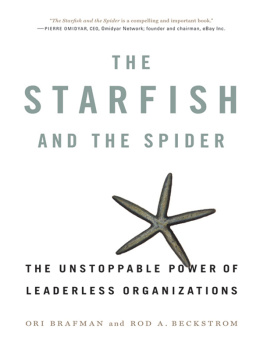Acknowledgments
ORI BRAFMAN:
Its only appropriate that a book about chaos would have its share of, well, chaos. It was written on military bases late at night, in cafs across San Francisco, and in New York apartments involving treasure chests of jewelry and the Secret Service. Im indebted to everyone whos made this entire journey possible.
Judah Pollack has been a partner involved in every bit of the writing process through thick and thin since the books inception, and Im fortunate to have benefited from his unrelenting curiosity, his tireless dedication, and his creative mind, which is an extraordinary incubator for ideas. Rom Brafman, as always, prevented the process from becoming overly chaotic and is the most supportive and selfless brother anyone could hope for. Kelly McVicker was an instrumental part of the writing and editing process and encouraged, inspired, and offered bits of magic when I needed them most. Steve Rotkoffs insights into the army were invaluable, and Im grateful to have had him as a friend through this process. Hilary Roberts and her red pencil continue to make me sound more refinednot an easy feat. I appreciate the discerning eyes of Alison Roberts, Heather Gunther, and Lori Matheson, who lent their time to read the manuscript at various stages along the way.
Im fortunate to have gotten to know General Martin Dempsey. His leadership gives even a Berkeley person like me faith in the military. Dave Horan has been a trusted guide and has offered enormously helpful advice. Maxie McFarland and Greg Fontenot were key in bringing my program to the army. Im continually grateful to the soldiers and officers who participated in the program, as well as the soldiers and families across the nation who continue to serve.
Esther Newberg and her team at ICMLiz Farrell, Kari Stuart, and Zoe Sandlercontinue to be unwavering champions. I cant imagine a better team to have on my side. Similarly, Roger Scholl has been a creative ally and gracious editor. His team at Random Housepublisher Tina Constable, editor in chief Mauro DiPreta, publicity and marketing director Tara Gilbride, publicist Ayelet Gruenspecht, production editor Cindy Berman, editorial assistant Derek Reed, interior book designer Songhee Kim, and jacket designer Drue Dixonhave been a joy to work with.
Throughout the writing process, Ive been bolstered by the support of family and friends: Tsilla and Hagay Brafman, Nira Chaikin, Josyn Herce, Megan and John Hutchinson, Lisa Kimball, Cort Worthington, Ron Ricci, Chip Colbert, Jason Thomas, Matt Brady, Denise Egri, Amy Pospiech, Dina Kaplan, Noah Kagan, Matt Miller and Katie Brown, David Blatte, Corey Modeste, Aviva Mohilner, Jessica Laughlin, Liz ODonnell, Sara Olsen, Josh Rosenblum, Mark Schlosberg, Michael Breyer, Amy Shuster, Rachman Blake, Pete Sims, Rudy Tan, Pam and Roy Webb, Kimberly Wicoff, Melanie Yelton, Barrett Horne, Ron Martin, and so many others. Im fortunate to have you in my life.
JUDAH POLLACK:
First I must thank Ori Brafman, for asking me what I was working on, for then inviting me on this trip, and for captaining the ship through storms and doldrums. To my formal guides, Rosenberg, Benjy, Isa, Cort, Lisa. And to my informal ones, Allan, Barrett, Olivia. To my ladies of genius, Sera and Meg, for letting me sit in. And to those patient souls, otherwise known as my family, for listening: Darci, Kate, Dov, Michael, Debarati, Noah, Hugh, Mom, and Dad. And to Tara, for loving me.
ALSO BY ORI BRAFMAN
Click: The Magic of Instant Connections (with Rom Brafman)
Sway: The Irresistible Pull of Irrational Behavior (with Rom Brafman)
The Starfish and the Spider: The Unstoppable Power of Leaderless Organizations (with Rod A. Beckstrom)

Make It Matter
I was sitting in an office with General Martin Dempsey months before he became the chairman of the Joint Chiefs of Staff. He wanted to know if I could help him.
In his late fifties, with close-cropped white hair and wearing his combat uniform, Dempsey certainly looked the part of a top military officer. But as I began talking to him, he didnt exactly fit the stereotype I had in my mind. Hes affable, well versed in literature and the classics, soft-spoken, down-to-earth, and quick to smile.
I met General Dempsey in his office at Fort Monroe, Virginia. It was a long, rectangular room in which every wall was decorated with plaques, ceremonial swords, and photos taken on the battlefield.
Three days earlier, I had been sitting on a Northern California lawn overlooking an organic garden, wearing shorts and flip-flops, and talking to my San Francisco friends about the importance of setting a vibe at a music camp-out (where several hundred people take to the woods, hauling a bunch of speakers and power sources with them, and DJs spin in the forest).
Now here I was , still a little sunburned, on a military base on the East Coast. There was nothing touchy-feely about the swords hanging on the wall. The steel was sharp, spotless, and very real. I felt more than a little out of place. My only prior exposure to the military had come from watching Hollywoods war movies and from seeing soldiers carrying Uzis when I was a young kid in Israel, before my family moved to the United States. (My father was such a poor fit for the Israeli military that he was assigned to a kibbutz for his compulsory service and spent his time harvesting bananas.) I majored in peace and conflict studies at the University of California at Berkeley. I live in San Francisco and Im a vegan.






